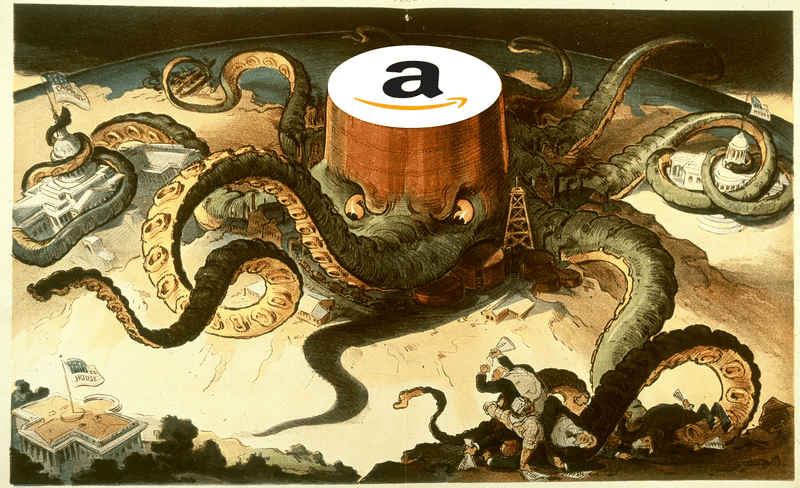March 31st, 2020
The metric for assessment of market power and dominance has traditionally been purely economic, in terms of market share and revenue. However, there is a case of a new mode of analysis wherein the concentration of user data in a handful of companies can be seen as having a significant influence within the market for services provided by these companies.

A 1904 political cartoon depicting the monopoly Standard Oil. Modified, 2017 ( Illustration by On the Media. Cartoon from the Library of Congress).
What Big Data does to Competitiveness in the Digital Market
The concentration of data amongst a few technologies and social media companies that provide services to maximum users makes them disproportionately powerful in the market of online services. User data across a host of services and purposes when concentrated amongst a small group of entities can be misused when left unregulated, as was seen most predominantly in the Cambridge Analytica debacle, where social media data was used to manipulate voter behavior.
The collection of data by a dominant market player tends to mean companies cannot replicate such data collection, either in terms of content or scale. This competitive advantage of an exclusive, proprietary dataset, allows the incumbent market player to offer new services with an implicit advantage. The market position that allows the company to offer free services further increases data collection, creating a self-perpetuating cycle. The presence of competitors has not managed to deter the anticompetitive behavior of larger platforms, as per a Market Study on E-Commerce by the Competition Commission of India (“CCI”).
What are Regulators Saying?
Dominant internet companies are in a position to dictate industry practices of data usage, owing to the small set of comparable competitors. This has led to competition concerns in multiple cases and countries, such as with the Google antitrust case and the Amazon investigation in the European Union (“EU”), and the order against Google by the Competition Commission of India. The order held that Google had indulged in anti-competitive practices by (i) pre-determining certain results on the search page; (ii) promoting its own services (apart from search) in the search results, thereby diverting traffic from other competitors providing similar services to its own services; and (iii) preventing partners in its search intermediation agreements from implementing any other similar services on their websites.
The prevalence of machine learning algorithms influences the pricing of services in the online market. Companies are able to adapt their pricing algorithms to price changes and fluctuations, resulting in leveling out of supra-competitive prices. There is a reduction of the uncertainty and biases that lend themselves to competitiveness. Much of this jurisprudence has come from the EU, currently taking the lead in the subject, with prominent cases such as those of Google’s search practices, and Amazon’s abuse of marketplace data. The US Federal Trade Commission is also currently mulling an antitrust probe into the integration of various Facebook applications. The CCI Study on E-Commerce also made the point that a lack of transparency in how platforms use data collected through their services on sellers puts them at a competitive advantage to promote their preferred sellers, creating a paid listing rather than a competitive market on the platform.
Is Indian Competition Law dealing with the impact of Big Data?
In the most standout case on the subject, the CCI had taken up the case of Google’s behavior in editing search results and online advertising, where the Commission ordered a fine of 5% (five percent) of Google’s average total annual revenue from India. The CCI found anti-competitive practices in Google’s role in shaping the access of other companies to the online market. This analysis, however, did not take into account the market power of Google in terms of its collection of data and was still based on market share. An Indian application of competition law to data collection will require an understanding of data as market power, which is as yet unrecognized by any judicial body within the country. Some useful starting points are the reports by the EU Data Protection Supervisor, and by the German and French competition authorities.
However, India is, amongst a host of other countries, coming up with a comprehensive legal framework to prevent the misuse of personal data. This is being done through restrictions based on consent, and restrictions on the use of data in terms of purpose, duration of storage, modes of usage, and on the collection and sharing of data. The draft legislation also specifies the requirement of portability of user data, though the terms of this requirement remain weak easily avoided through “technical infeasibility”.
There currently already exist a number of companies that already control large datasets. Companies’usage of data determines their power in the market, and new modes of usage of user data can strengthen a company’s position within more than one relevant market simultaneously. Usage of end-user data in advertising, for example, helps the companies collecting such data strengthen their own market position with respect to advertising, and improve their own service, as explained earlier. The CCI Market Study on E-Commerce in India noted that the collection of competitively relevant data by platforms enables them to start business ventures in top-selling niche market categories, a direct benefit of their position as an intermediary.
A robust framework monitoring the usage of data by companies collecting and processing it is needed in order to bring about greater predictability in the market of online services. This in turn will help startups and mid-range companies have greater access to user data by being able to compete wills services offered by the biggest names in the online market.

